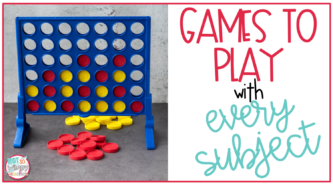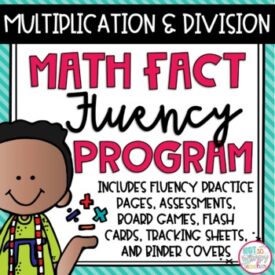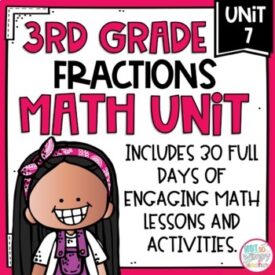
Today we’re talking about a controversial subject: homework. Just the word is often enough to give you a headache. Everyone has an opinion about homework. Should we give it? How much? What’s the point of homework? Well, I’m not going to sugarcoat it. Here are my opinions about homework. I know they might not be very popular.
For a long time, I gave homework. I bought into all the reasons that educators give for assigning homework:
- It reinforced learning
- It was an important way to assess learning
- It helped kids develop responsibility
- Parents expected it
But over time, I realized that each and every one of these excuses was malarky. There really is not a good reason to give homework, especially not in elementary school.
Luckily, we are seeing a big push from parents, educators, and mental health experts to reduce or even eliminate homework. And I couldn’t be more excited. Research shows that homework has little positive effect on learning, and it can lead to stress, anxiety, and depression.
So here are my five unpopular opinions about homework.
7-8 hours of schoolwork is more than enough.
Children already spend a third of their day in school. This is more than enough time. Asking young kids to sit still, be quiet, and focus for that long takes a toll on them. When they get home from school, the last thing they need is more work.
Children need time to play, run around, and ride bikes. They need time to try a new hobby, learn a sport, or play a musical instrument. They need to hang out with their family and rest from their busy day at school.
Assigning homework, however, teaches them that eight hours of work a day is not enough. You must continue working after you go home. You must always be busy and productive. These are lessons that they will carry throughout their lives. Lessons that lead to overwhelm and exhaustion and burnout.
So let’s stop the cycle right now. Let’s lose the expectation that taking work home with us is natural and normal and that working is the most important thing in life.
Homework isn’t for parents.
Many parents expect their kids to have homework. And some parents actually want it. They can be a vocal bunch. But I promise you there are just as many parents who will be thrilled if you abolish homework in your classroom!
Homework isn’t for parents anyway. If you assign homework, it should be based solely on what’s in the children’s best interests.
And you are the professional. You know what’s best for kids. (And after reading this blog post, I hope you know that it’s not homework.)
If parents insist on homework, suggest they spend more time reading with their child. Another great idea is to create a journal where they can write letters back and forth with one another. You could also encourage them to take up a hobby together (like cooking), go on nature walks, or play board games together.
These are healthy ways to keep learning at home without the pressure of nightly graded assignments.
There are lots of other ways to teach responsibility.
Children don’t need homework to develop responsibility. They are already responsible for bringing in their bookbag, lunch box, water bottle, etc . . . every day. They need to remember when it’s gym day.
Our students practice responsibility by checking books out of the library, taking care of them, and returning them on time.
Children can learn responsibility in the classroom by taking care of their school supplies, helping out in the classroom, or mentoring younger students.
Children also learn responsibility at home. Maybe they help take care of younger siblings or pets. They might set the table, take out the garbage, or do other chores.
Homework should not review skills that have just been taught that day.
Many teachers think homework is necessary to reinforce learning, and they assign worksheets that require students to practice new skills right away.
But most kids aren’t ready to practice a new skill independently. They need additional support before they can successfully complete assignments on their own. Sending home worksheets before they are ready to complete them is pointless. It does not show what they know, and it does not support growth.
Homework that is too difficult for kids is incredibly frustrating. When they don’t have a deep enough level of understanding to complete the work on their own, they get confused. They make mistakes. And they wind up worse off than they were before.
If students can’t complete assignments independently, they will naturally ask for help. Unfortunately, not all kids have the same level of support at home.
An assignment that is intended to take ten minutes can take two hours and leave a child feeling anxious and exhausted. Not to mention insecure.
Homework assignments should only require skills that students have been given ample time to practice and master in class. This allows students to be successful with the tools and support available to them at home.
Homework should not be graded.
If you take nothing else away from this article, please consider making this one change: Stop grading homework.
It’s not necessary. It doesn’t tell you anything about what a child knows. And it’s not fair.
Not all children have access to the same support or tools at home. Some kids have high-speed internet, tons of books, and parents who can and want to help. They provide a nutritious after-school snack, check every problem, and offer a quick mini lesson when the child is confused.
Others have none of this. They may be home with an older sibling after school. They may even be home alone. The adults in their families might work long hours. They might not have the skills themselves to help with homework.
Some families have no internet. Or have one device for the entire family to share. We can’t assume that all children have equal access to support at home.
Grading homework is not fair because you are not actually grading what a child knows. You are grading the level of support they have at home.
And, honestly, you have no idea who actually completed work at home. A parent might have done the entire assignment.
Plus, not grading homework is a win for you! Just think about how much time you will save.
What to do if your school requires homework
I know a lot of schools, even elementary schools, require homework. If that applies to you, try one of these strategies to keep homework manageable:
- Send home as little as possible. Ten minutes a night is plenty.
- Assign kids reading as homework – not a specific book or passage, but anything they want. In addition to improving reading skills, this will help develop a love of reading.
- Try weekly assignments. If you have to give homework four nights a week, send it all home on Monday and allow students to complete it at any time during the week. This allows greater flexibility for students and their families.
How to Love Teaching Again

If you like real talk about teaching, you’ll love my new book, How to Love Teaching Again. In it, I share many helpful tips, like how to save time grading to help simplify teaching so you have more time for a life you love. This book is:
- a heartfelt, hands-on guide to setting boundaries, increasing productivity, and finding fulfillment as a teacher.
- packed with simple, actionable strategies that you can implement right away.
- peppered with funny stories and real-life examples to make it a quick and FUN read.
- NOT a textbook–it’s a practical guide to help you beat burnout, overcome perfectionism, and fall in love with teaching again.
You’ll also get these three AWESOME bonuses:
- Book Club Kit: Want to host a book club at your school? This Book Club Kit includes a calendar of events, suggested reading schedule, reflection questions, and tips for implementing the most important strategies in each chapter!
- Yearlong Pacing Guides for grades 2-5: If you teach grades 2-5, you can just download and go! If not, these are great examples of how to create your own yearlong pacing guide and save yourself a ton of stress and time. Either way, they are pure gold.
- Editable Sub Plan Templates: From daily schedule to lesson plan template to classroom behavior plan and more, these templates include everything you need to plan for a sub without breaking a sweat. (In both digital and printable formats!) And the great thing is, most of these pages can be done in advance. So when you need to take a day off, you’ve got everything all ready to go!

Have a Not So Wimpy Day,


















 End of Year Carnival Week for grades 2-5!
End of Year Carnival Week for grades 2-5!
I have not been assigning much homework for years beyond 1/2 hour of reading and practicing math facts. I also give my 3rd graders a short reading passage that’s numbered, for fluency. They read it out loud for 1 minute every day and turn in on Friday. The passage is related to what we ate studying in class so I can sneak more content and vocabulary in.
I have had nothing but positive feedback and relief from parents when I announce this policy at the beginning of the year. No more homework battles!
I also explain to my students that the only way they will have more homework is if they don’t complete their work in class. This has helped my students stay on task during class time.
Thank you for the post, Jamie! I taught 5th-grade years ago and assigned minimal homework. They had to read, return parent correspondence, and finish any incomplete classwork. I taught responsibility by not being “mom.” I asked for the assignments the next morning, one by one, but I didn’t follow up with the kids who didn’t return them. They had a folder where they could see what they were missing, and it was up to them to check and get them turned in.
At first, this was harsh for them because they had their hands held in K-4. I was always kind, but if they asked about their work, I would shrug and say, “check your folder.” By the end of the first semester, they were experts. The parents thanked me two years later when they went to middle school. They knew how to write down assignments, complete them, and turn them in without anyone nagging them. You can still do this without assigning a bunch of homework!
Thanks for sharing your homework procedure and routine.
I completely agree. I have also found that the kids who need the additional practice don’t do the homework, and the kids who do not need additional practice do the homework. It really is more of an indication of the level of parental support. Unfortunately, at my school the principal requires the grade levels to be consistent in homework assignments. While I try to do what my principal requires, I’ve tried not to penalize the kids who do not return the homework. My school system even requires a “learning skill” grade for homework completion. I am moving to 4th next year. I’m already stressing the homework requirements I’ll have to incorporate. Practice math facts with a card or dice game and read are my preferred homework assignments.